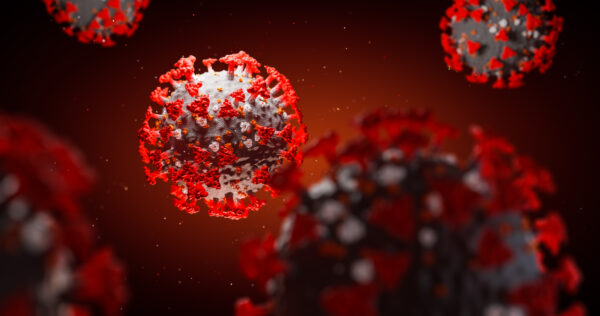
One of the companies developing a novel antiviral drug against the virus that causes Covid-19 has released proof-of-concept data indicating a large reduction in risk of hospitalization among those receiving the drug compared with patients in the placebo group.
Indianapolis-based Eli Lilly announced Wednesday data from an interim analysis of its Phase II BLAZE-1 trial of LY-CoV555 – a monoclonal antibody designed to neutralize the SARS-CoV-2 virus – in patients with mild to moderate disease in the outpatient setting. The data showed that while patients in the treatment and placebo arms mostly showed nearly complete viral clearance by day 11, those in the 2,800mg dose group achieved it earlier, by day 3, with a reduced proportion of patients showing persistently high viral load later on. The 302 patients receiving the drug at that dose showed a 1.7% rate of hospitalization and visits to the emergency room, compared with 6% of the 150 receiving placebo, translating into a 72% reduction in risk, the company said. However, while the 2,800mg dose reached the study’s primary endpoint of change in baseline viral load at day 11, the other dose levels – 700mg and 7,000mg – did not.
Lilly said it plans to “quickly” publish the results in a peer-reviewed journal and discuss next steps with regulators. The trial is still ongoing and is also testing LY-CoV555 in combination with another antibody, LY-CoV016, which binds to a different epitope of the SARS-CoV-2 virus’ spike region. The trial’s target enrollment is 800 patients.
Shares of Eli Lilly (NYSE: LLY) were up about 1% on the New York Stock Exchange Wednesday morning.
“These interim data from the BLAZE-1 trial suggest that LY-CoV555, an antibody specifically directed against SARS-CoV-2, has a direct antiviral effect and may reduce Covid-related hospitalizations,” said Daniel Skovronsky, Lilly’s chief scientific officer, in a statement. “The results reinforce our conviction that neutralizing antibodies can help in the fight against Covid-19.”
In a note to investors, Cowen analyst Yaron Werber wrote that the data were “mixed but constructive” and “encouraging.” However, he added that the data also raise questions and concerns about the effect size. The strong placebo effect, he wrote, raises a question about the optimal timing and threshold to assess viral loads.

A Deep-dive Into Specialty Pharma
A specialty drug is a class of prescription medications used to treat complex, chronic or rare medical conditions. Although this classification was originally intended to define the treatment of rare, also termed “orphan” diseases, affecting fewer than 200,000 people in the US, more recently, specialty drugs have emerged as the cornerstone of treatment for chronic and complex diseases such as cancer, autoimmune conditions, diabetes, hepatitis C, and HIV/AIDS.
Morgan Stanley analyst David Risinger called the data encouraging at a high level, but added that it would be necessary to wait for the published data to get more details, such as whether there were any imbalances. The small sample size makes it difficult to interpret the pooled hospitalizations and emergency room visits in the primary endpoint data, he wrote, pointing also to the near complete viral clearance by day 11. However, an emergency use authorization from the Food and Drug Administration is possible, he added.
Indeed, multiple other companies are taking the antibody route as well. A notable player is Tarrytown, New York-based Regeneron Pharmaceuticals, which is developing a two-antibody cocktail therapy known as REGN-COV2, currently in Phase III development. That drug is being developed both for infected patients and as a preventive therapy. The company said Monday that it had opened the Phase III RECOVERY trial of the drug in the U.K. The strategy behind using a drug cocktail is similar to the approach used in HIV therapy, in that it makes it more difficult for the virus to develop the resistance mechanisms that can occur when only a single drug is used.
Photo: Maksim Tkachenko, Getty Images












